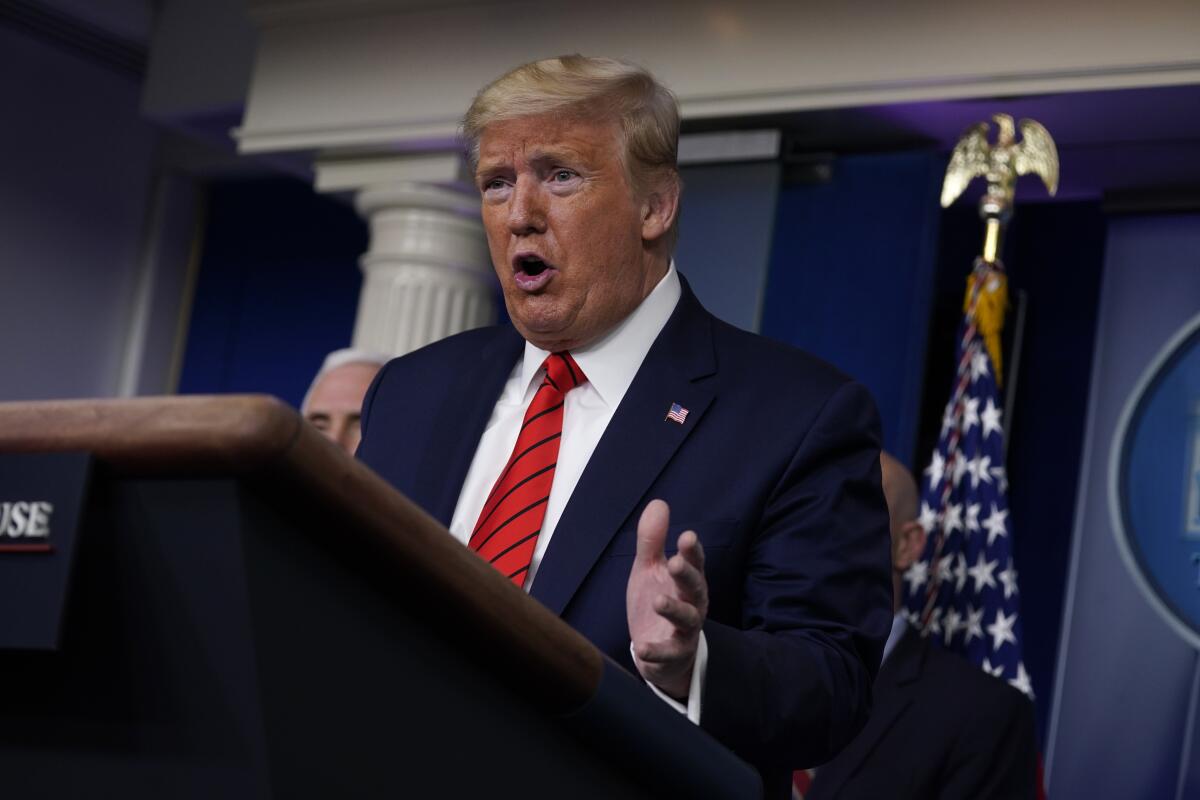Newsletter: Thank you, Mr. President, for being a lousy doctor

I’m Business columnist David Lazarus, with a look today at America’s willingness to market prescription drugs directly to consumers.
President Trump has done the nation a favor, although he didn’t intend to. By pitching untested drugs as possible coronavirus cures, he has demonstrated the danger of removing trained medical professionals from the equation.
Trump’s highly publicized support for the malaria drugs chloroquine and hydroxychloroquine as potential COVID-19 remedies — before clinical trials could be run by the Food and Drug Administration — is an example of a man with no medical training making medical claims to people who lack a medical background.
It’s a classic case of the blind leading the blind, with potentially dire consequences should the drugs prove to be hazardous when used in this unintended way.
“I feel good about it,” Trump said of the unproven drugs, which his own medical experts have said may not be suitable for coronavirus patients. “That’s all it is, just a feeling, you know, smart guy. I feel good about it.”
His repeated declarations of support for the malaria drugs have resulted in shortages for people who need them.
U.S. hospital orders for chloroquine jumped by 3,000% from March 1 to 17, according to Premier Inc., a group-purchasing organization for hospital supplies. Hydroxychloroquine orders were up 260%.
An Arizona man died and his wife was in critical care after they took chloroquine phosphate to stave off the coronavirus. Rather than taking the pharmaceutical version of the drug, they took “an additive commonly used at aquariums to clean fish tanks,” according to the hospital system Banner Health.
This illustrates why nearly every country on Earth has rules against drug companies marketing prescription drugs directly to consumers. “The information provided is unreliable and potentially misleading,” Yale University researchers concluded in a 2018 study.
A reader, Sue Gladieux, told me the other day about feeling bombarded by drug ads on TV during our national house arrest.
“The worst part is listening to the side effects and the ridiculous music they think makes sense with a drug,” she said. “I think it’s depressing that every 15 minutes I have to hear about heart attacks, diabetics, blood clots and multiple diseases.”
Gladieux, 67, called for a national petition “to get these off TV.” It would have my support.
There’s no upside to trying to educate ordinary people about complex medical issues using 30-second or one-minute ads. It’s a recipe for confusion, particularly with all the risks smushed into a hurried jumble of hard-to-hear verbiage.
Only the United States and New Zealand allow such ads.
The American Medical Assn. called for a ban on direct-to-consumer drug marketing in 2015, arguing that the billions of dollars spent on such campaigns pushes prices higher and “inflates demand for new and more expensive drugs, even when these drugs may not be appropriate.”
The National Academy of Sciences has called on Congress to “disallow direct-to-consumer advertising of prescription drugs as a tax-deductible business expense” to refocus manufacturers’ priorities.
Trump’s ill-informed promotion of unapproved drugs during a global pandemic is a helpful reminder of why healthcare professionals, and healthcare professionals alone, should be offering people guidance on such matters.
And for our part, we’d do well to ignore the ceaseless drug commercials on TV, and to take any medical advice from politicians with a grain of salt.
Listen to trained professionals. Everyone else is just trying to sell you something or isn’t qualified to address the subject.
Enjoying this newsletter? Consider subscribing to the Los Angeles Times
Your support helps us deliver the news that matters most. Become a subscriber.
Now then, here are a couple of recent stories from our pages worth highlighting:
Sick leave: The federal government’s emergency coronavirus relief law includes paid sick leave benefits for American employees at small to midsize firms who have to take time off because of the spreading virus. But the law includes exceptions that some analysts said could exclude nearly 20 million private-sector workers.
Jobless benefits: If you’ve lost a job or had hours reduced due to the pandemic, you can file a claim for unemployment benefits. Parents who have to stay home to care for a child due to a school closure are also eligible.
Recalls
Ford is recalling nearly 250,000 Fiestas, Fusions and Lincoln MKZs manufactured from 2014 to 2016. The door latch on some vehicles may be faulty, causing the door to open while driving.
Grizzly Industrial is recalling more than 20,000 children’s tool kit sets. The Consumer Product Safety Commission says some components violate the federal standard for lead content in toys or do not meet toy safety requirements.
Spare change
Ads for prescription drugs pretty much stick to the same formula: People with problems whose lives are completely turned around by the miracle of medical science. Our friends at “Saturday Night Live” have applied this to Taylor Swift-related disorders and “Heroin AM.”
Stay in touch
Let me know what you think of the newsletter. My email is [email protected], or you can find me on Twitter @Davidlaz. Also, tell all your pals to join the party.
Until next time, see you in the Business section.
Inside the business of entertainment
The Wide Shot brings you news, analysis and insights on everything from streaming wars to production — and what it all means for the future.
You may occasionally receive promotional content from the Los Angeles Times.




